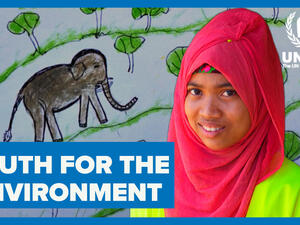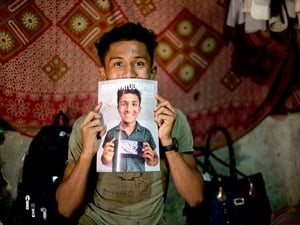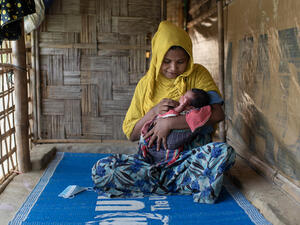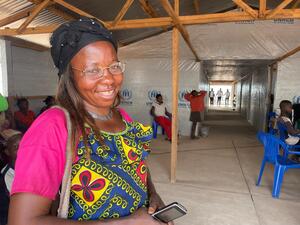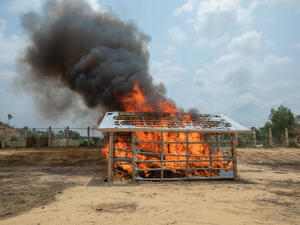Rohingya return rests on safety and trust, says UNHCR's Volker Türk
Rohingya return rests on safety and trust, says UNHCR's Volker Türk

Volker Türk UNHCR's Assistant High Commissioner for Protection visiting refugees at Kutupalong refugee camp in Bangladesh.
DHAKA, Bangladesh – The UN Refugee Agency’s Assistant High Commissioner for Protection, Volker Türk, concluded his visit to Bangladesh today with a call to mitigate the impact of refugees on host communities and to respect the right for the Rohingya to return to a place they can call home.
During his five-day visit, Türk met with some of the estimated 600,000 refugees who have fled violence in Myanmar’s northern Rakhine state since late August. He saw first-hand the link between statelessness and forced displacement.
“The situation today is the result of a long series of discrimination over the years – the lack of documentation, freedom of movement, access to livelihoods,” said the Assistant High Commissioner. “The refugees told me they feel like they don’t belong.”
"We had to cross 11 hills and spend 12 days hiding."
In an extension of Kutupalong camp in Cox’s Bazar district, he met Abdul Salam, a man nearing 100 years old who had fled Buthidaung with his wife and two daughters in early September.
“In total I escaped to Bangladesh four times,” said Abdul Salam. “In 1942 when the Japanese came, then again in 1978. The third time I can’t remember [likely 1991]. But this time was the most difficult. We had to cross 11 hills and spend 12 days hiding in the forest. I couldn’t walk or see, so they had to carry me.”
His wife Mostaba Khatun, 60, has been a refugee three times: “In 1978, people demanded: ‘Show us your papers, you don’t belong here.’ So we were forced to leave.”
Husson Ali, 38, described how his village in Rathedaung was razed in mid-September. “So many people died when they were trapped in their burning houses. Those who could run fled to the forest. There is no one left in our village.”
Housed in a UNHCR tent in Kutupalong Extension, he has no idea what the future holds. His priority today is to feed his pregnant wife and four young children with the food rations they’ve received.

Volker Türk UNHCR's Assistant High Commissioner for Protection visiting refugees at Kutupalong refugee camp in Bangladesh.
UNHCR is working with the Bangladesh government and its partners to provide life-saving assistance and protection for the refugees. This includes providing food, clean water, shelter and health care, as well as trauma counselling and reunification for separated families.
The agency is also aware of the impact this influx has had on the host communities which are themselves impoverished.
- See also: First results of family counting in Bangladesh find every third refugee household vulnerable
“It’s crucial to engage with both the refugees and their local hosts in ways that will meet their needs,” said Türk. “We can turn this crisis into an opportunity by mobilizing development actors and the private sector to develop the area – as we have done since the 1990s by investing in roads, bridges, schools and health centres to everyone’s benefit.”
Since 1992, UNHCR has spent millions of dollars to build or improve these community projects. Most recently, the agency contributed US$2 million towards the building of an access road to Kutupalong Extension, and donated medical equipment to several local hospitals to help them cope with the increased patient caseload. It is also supporting staffing needs to extend consultation hours to 8 pm in the main hospital in Cox’s Bazar.
"There has to be safety and guarantees of protection."
Asked about his plans, new arrival Husson Ali said matter-of-factly, “If things improve and we are accepted as Rohingya in Myanmar, we can go back and stay with the other communities.”
UNHCR’s Türk agreed: “For return to happen, it’s clear there has to be safety and guarantees of protection. There has to be a very serious commitment to immediately implement the recommendations of the Rakhine Advisory Commission report that was launched and validated by the State Counsellor. We really need to see urgent action that will build the confidence of different communities. They will need to find a way to live together again, as they have done in the past.”
He appealed to Abdul Salam as a community elder to help bring the communities together in future. The old man nodded, “Yes, we have to make peace.”
The Assistant High Commissioner completed his visit to Bangladesh by meeting with UN and NGO partners as well as officials from the Prime Minister’s Office and the relevant Ministries.
- Your support is urgently needed to help refugees in Bangladesh. Please give now.


